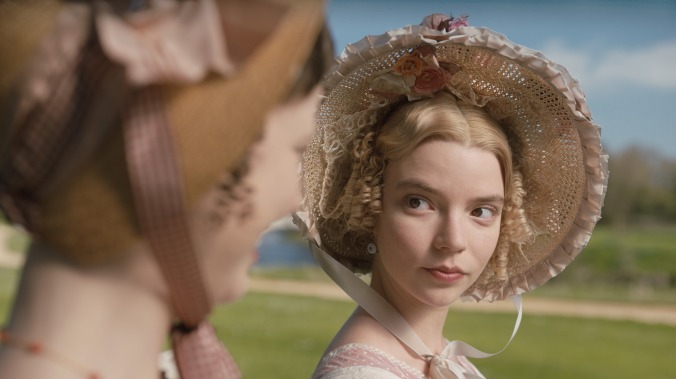Jane Austen's Emma gets an oddball, sumptuous, and smart new adaptation


For the final novel published during her lifetime, Jane Austen set out to write “a heroine whom no one but myself will much like.” Unlike the noble underdogs of Pride And Prejudice and Sense And Sensibility, Emma Woodhouse is a wealthy, entitled young woman whose problems are largely of her own making. “The real evils, indeed, of Emma’s situation,” Austen explains, “were the power of having rather too much her own way, and a disposition to think a little too well of herself.” In her curiously punctuated adaptation, prolific music video helmer Autumn de Wilde pushes her protagonist’s haughty unlikeability even further. De Wilde’s stylish, stylized Emma. doesn’t rewrite the Austen playbook, but it shakes it up a bit—emphasizing the stakes of Emma’s careless meddling and adding a spiky 21st-century sensibility to Austen’s 19th-century ode to checking your privilege.
Anchoring it all is horror darling Anya Taylor-Joy, who makes for a particularly icy Emma. Her tiny ringlets reflect her obsession with propriety, order, and control. Left alone with her loveably ornery father (Bill Nighy, funny but underused) after her governess marries, Emma decides to fill her time by becoming a matchmaker. She takes on a new companion in humble student Harriet Smith (Mia Goth) and steers her protégé away from modest farmer Robert Martin (Connor Swindells) and towards highborn vicar Mr. Elton (Josh O’Connor), even as it’s clear Elton only has eyes for Emma. That mishap kickstarts a whole series of romantic conundrums, which will eventually embroil out-of-town visitors Jane Fairfax (Amber Anderson) and Frank Churchill (Callum Turner, appropriately dashing), as well as George Knightley (Johnny Flynn), the neighbor and family friend who disapproves of Emma’s scheming because he actually believes in her depth and intelligence in a way few others do.
De Wilde’s boldest choice is using the tone to reflect Emma’s arc from intelligent but dispassionate meddler to a young woman bowled over by her flaws and her capacity for love. The first half of Emma pairs its fondant aesthetic with a chilly detachment that initially reads as a lesser knockoff of the center-framed absurdism of The Grand Budapest Hotel or The Favourite. The emphasis on pastel production design, sumptuous shots of food, and comically high collars seem to doom de Wilde’s feature debut to that dreaded “style over substance” complaint. As messy emotions begin to foil Emma’s carefully laid plans, however, the film itself embraces a more emotive tone, eventually getting closer to the sweeping romanticism of Joe Wright’s Pride And Prejudice. It’s only in retrospect that you can appreciate how deftly de Wilde handled the shift.
Where Emma falters is in its uneven deployment of comedy. De Wilde clearly wants to highlight the humor that’s sometimes lost in Austen adaptations (though not, notably, in Clueless, Amy Heckerling’s celebrated modern-dress take on Emma), but in place of the satire and irony of Austen’s text, she adopts a new strain of absurdist cringe comedy. Moments of servants awkwardly bumbling through their duties are hit or miss, and there are broad comedic beats that completely fall flat, particularly with O’Connor’s Elton. More interesting is de Wilde’s focus on the human imperfections lurking just beneath the perfectly manicured Georgian world—like an inconvenient nosebleed or a shot of Emma lifting up her dress to warm her butt by the fire. Even the rich aren’t immune to bodily inconvenience, as Emma’s hypochondriac family knows all too well.
Though the adaptation by novelist Eleanor Catton is a relatively faithful one, she makes a few subtle structural changes that effectively re-enliven the material. There’s more attention paid to the genuine friendship between Emma and Harriet, including a sweet scene where they practice for a ball in nightgowns and hair curlers. And much more so than the sunny 1996 version starring Gwyneth Paltrow, this adaptation recognizes the real stakes at play in Emma’s casual meddling with Harriet’s life. Lowborn Harriet isn’t as free to throw away potential suitors as Emma, whose independent wealth means she only has to marry if she wants to. In a welcome modern touch, Catton gives Emma more agency in righting her own wrongs. This Emma starts colder, but she ends humbler too.
The most effective adaptation choice is to speed up the timeline of Emma and Knightley’s burgeoning attraction, which increases the tension in the second half of the film, as Knightley grows jealous of Emma’s friendship with Frank and Emma makes a cruel social blunder towards town flibbertigibbet Miss Bates (Miranda Hart in a perfect tragicomic performance). Taylor-Joy and Flynn find real fire in their dynamic as they argue with the ease of two people who’ve known each other all their lives, and Catton’s screenplay ensures that Knightley learns his own lessons as well. A musician-turned-actor, Flynn nails the simmering emotional repression that makes so many of Austen’s male heroes so compelling, and his earthy, impassioned take on Knightley is a bit of a revelation. It’s his performance, and his chemistry with Taylor-Joy, that are ultimately the biggest reasons to recommend this stylish, occasionally overstuffed Emma update.